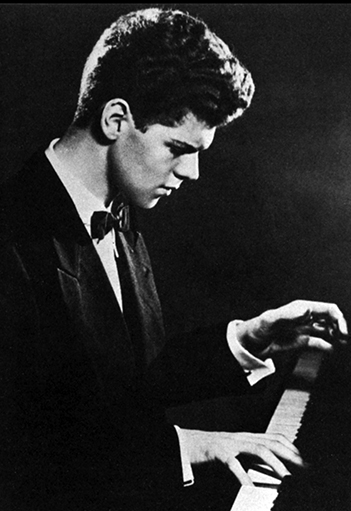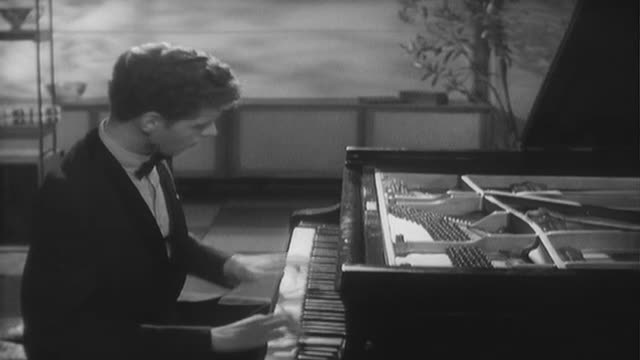
Van Cliburn’s mother was a pupil of Arthur Friedheim who had studied with Franz Liszt. In 1940 his father was transferred with his work to Texas, and it was there that Van grew up. At the age of twelve he won a local piano competition, the prize being a performance with the Houston Symphony Orchestra. During the next few years Cliburn studied music theory at the Juilliard School in New York, and in March 1948, as the Texas winner of the National Music Festival Competition, he took part in a concert at Carnegie Hall. His mother had given him a sure grounding in technique, and he then continued his studies with Rosina Lhévinne at the Juilliard School for three years.
By the time he graduated in 1954 he was signed up by Columbia Artists Management and had played recitals and concerto performances in his local area. At this time he also won the Leventritt Award where he was in competition with John Browning. Many orchestral engagements followed this win, including concerts with the New York Philharmonic Society and with the orchestras of Denver, Buffalo, Cleveland and Pittsburgh. Two months after winning the Leventritt Award, Cliburn played Tchaikovsky’s Piano Concerto No. 1 Op. 23 at Carnegie Hall with Dimitri Mitropoulos and the New York Philharmonic Orchestra. However, between 1954 and 1958 Cliburn’s career did not take off. He played a modest number of engagements in America, and family commitments required his returning to his home in Texas. It was not until he entered the International Tchaikovsky Competition in Moscow that his life and career changed dramatically. In April 1958 he won the Gold Medal in Moscow, returning to a ticker-tape reception on Broadway, something unheard of for a concert pianist (it was the kind of public reception only afforded pianists of the stature of Paderewski, Liszt and Anton Rubinstein) and was, in its way, an antidote to the Russian success of Sputnik at the height of the Cold War.
Cliburn played Tchaikovsky’s Piano Concerto No. 1 Op. 23 and Rachmaninov’s Concerto No. 3 Op. 30 at Carnegie Hall, and recordings were released by RCA Victor who had immediately signed him to a recording contract. A punishing schedule began, with debuts in many European cities, including his London debut with the same concertos at the Royal Albert Hall. The whirlwind of concerts, television appearances, interviews and recordings did not abate, and Cliburn had the added burden of learning and practising new repertoire for forthcoming engagements. He toured during the 1960s and 1970s but became disillusioned with the life of a concert performer. The relentless pressure of countless performances took its toll, leaving him emotionally and musically exhausted. Critics complained of his emotional detachment, his percussive sound and the small size of his repertoire. For any artist, the attempt to recapture former glory is a desperate pursuit. If the public and critics were disappointed with the way Cliburn’s career had developed, what must it have been like for the man himself? In 1978, without any announcement, Cliburn took a sabbatical that eventually lasted ten years.
In 1986 Cliburn settled in Fort Worth, Texas, where he set up the Van Cliburn International Piano Competition, and in 1987 was invited to play at the White House for Mikhail Gorbachev. From then he continued to play in public, returning to Russia in 1989, but a planned tour of America with the Moscow Philharmonic Orchestra in 1994 had many problems, and the death of Cliburn’s mother at this time must have added to his pressures.
Cliburn’s musical affinity was with the Russian Romantic repertoire. He excelled in the concertos of Tchaikovsky, Rachmaninov and Prokofiev, and also played some by Beethoven, both Brahms concertos, both Liszt concertos, Chopin’s No. 1, and those by Grieg and Schumann. However, later in his career he was criticised for only playing Tchaikovsky’s Piano Concerto No. 1 Op. 23 and Rachmaninov’s Concerto No. 3 Op. 30, the two works with which he won the Tchaikovsky Competition. He played barely any Bach, a little Mozart, some Beethoven, Debussy and Ravel, but, as he himself knew, it was with the great works of the Romantic era that he could fully express himself. Also in his repertoire were Barber’s Piano Sonata and Edward MacDowell’s Piano Concerto No. 2.
Cliburn’s best recordings are the performances he gave, on his return to America in May 1958, of the concertos with which he won the Tchaikovsky Competition. Both Rachmaninov’s Piano Concerto No. 3 Op. 30 and Tchaikovsky’s Piano Concerto No. 1 Op. 23 are given fresh, heroic, and fluent readings; the Tchaikovsky became the first classical LP to sell a million copies. Rachmaninov’s Piano Sonata No. 2 Op. 36 recorded live in Moscow in 1960 also displays Cliburn’s naturally rhapsodic approach to this repertoire and was famously described by Bryce Morrison as ‘stewed in Russian juices’. Cliburn will always be remembered as one of the greatest of American pianists whose early success is unmatched by any other American artist.
© Naxos Rights International Ltd. — Jonathan Summers (A–Z of Pianists, Naxos 8.558107–10).
| Title | |
| CHOPIN, F.: Ballade No. 3 / Scherzo No. 3 / Fantasy in F Minor (Cliburn) / BEETHOVEN, L. van: Piano Sonatas Nos. 23 and 32 (Arrau) | |

|
CHOPIN, F.: Ballade No. 3 / Scherzo No. 3 / Fantasy in F Minor (Cliburn) / BEETHOVEN, L. van: Piano Sonatas Nos. 23 and 32 (Arrau)
Composers:
Beethoven, Ludwig van -- Chopin, Fryderyk
Artists:
Arrau, Claudio -- Cliburn, Jr., Van
Label/Producer: ICA Classics |
